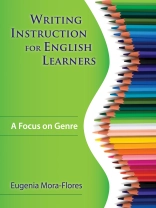‘It is all too easy to skip steps or assume that students already have certain skills. This book helps ensure that the proper steps are taken to allow EL students to be successful in various genres of writing.’
—James Becker, ELL Teacher/Administrator
Toronto, ON, Canada
‘I felt as if I had taken an entire writing course just by reading this book!’
—Rachel A. Mederios, ELL Teacher/Program Supervisor
Jefferson Elementary School, Boise, ID
Provide solid writing instruction to English learners!
Exposing students to various genres of written text is one of the most powerful approaches to guiding development in writing. This resource helps teachers combine explicit and intentional strategies to facilitate writing development across genres for English learners in Grades 2–8.
Based on the author′s extensive experience as a writing instructor, this guide provides a unique approach that emphasizes using choice and students′ personal experiences to engage English learners in writing. Chapters outline a variety of scaffolds that provide students with the targeted help they need, based on their current development and proficiency. These supports allow teachers to work with students as they analyze elements of written text, work alongside peers, and learn to write in different genres. Teachers will find:
- Resources for teaching narrative, expository, and persuasive writing and poetry
- Techniques for using the process writing model to lead students through pre-writing, drafting, revising, editing, and publishing their work
- Reproducible graphic organizers for use with English learners
- Samples of student work
Writing Instruction for English Learners is rich in proven, practical techniques to equip educators with the tools they need to guide English learners to write more skillfully.
Tabla de materias
Acknowledgments
About the Authors
Introduction
1. Writing Instruction for English Learners
Process Versus Product
Writing Process
The Role of Talk
Developing Written English
Conclusion
2. Narrative Writing
Understanding Narrative Writing
Narrative Essays
Narrative Genres
Making it Public
Conclusion
Resources for Teaching Narrative Writing
3. Expository Writing
Understanding Expository Writing
Expository Essays
Expository Genres
Making it Public
Conclusion
Resources for Teaching Expository Writing
4. Persuasive Writing
Understanding Persuasive Writing
Persuasive Essays
Persuasive Genres
Making it Public
Conclusion
Resources for Teaching Persuasive Writing
5. Poetry
Understanding Poetry
Poetic Forms
Making it Public
Conclusion
Resources for Teaching Poetry
Concluding Thoughts
Resources
References
Index
Sobre el autor
Eugenia Mora-Flores is a Professor of Clinical Education and Chair of the Master of Arts in Teaching program in the Rossier School of Education at the University of Southern California (USC). She teaches courses on first and second language acquisition, Latino culture, and in literacy development for elementary and secondary students. Her research interests include studies on effective practices in developing the language and literacy skills of English Learners in grades Pre-K-12. She has written 10 books in the area of literacy and academic language development (ALD) for English learners. Eugenia was named, USC’s MAT Professor of the Year (2016 & 2018), USC’s Teaching Excellence Award (2018) and the 2018 Community Achievement Award, this award recognizes professors who have made meaningful contributions to the educations of students of color and/or who identify as LGBTQ. Eugenia further works as a consultant for a variety of elementary, middle and high schools across the country in the areas of English Language Development (ELD), ALD and writing instruction.












